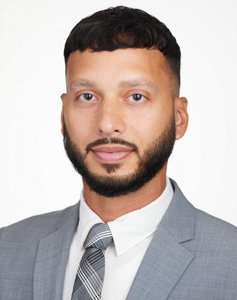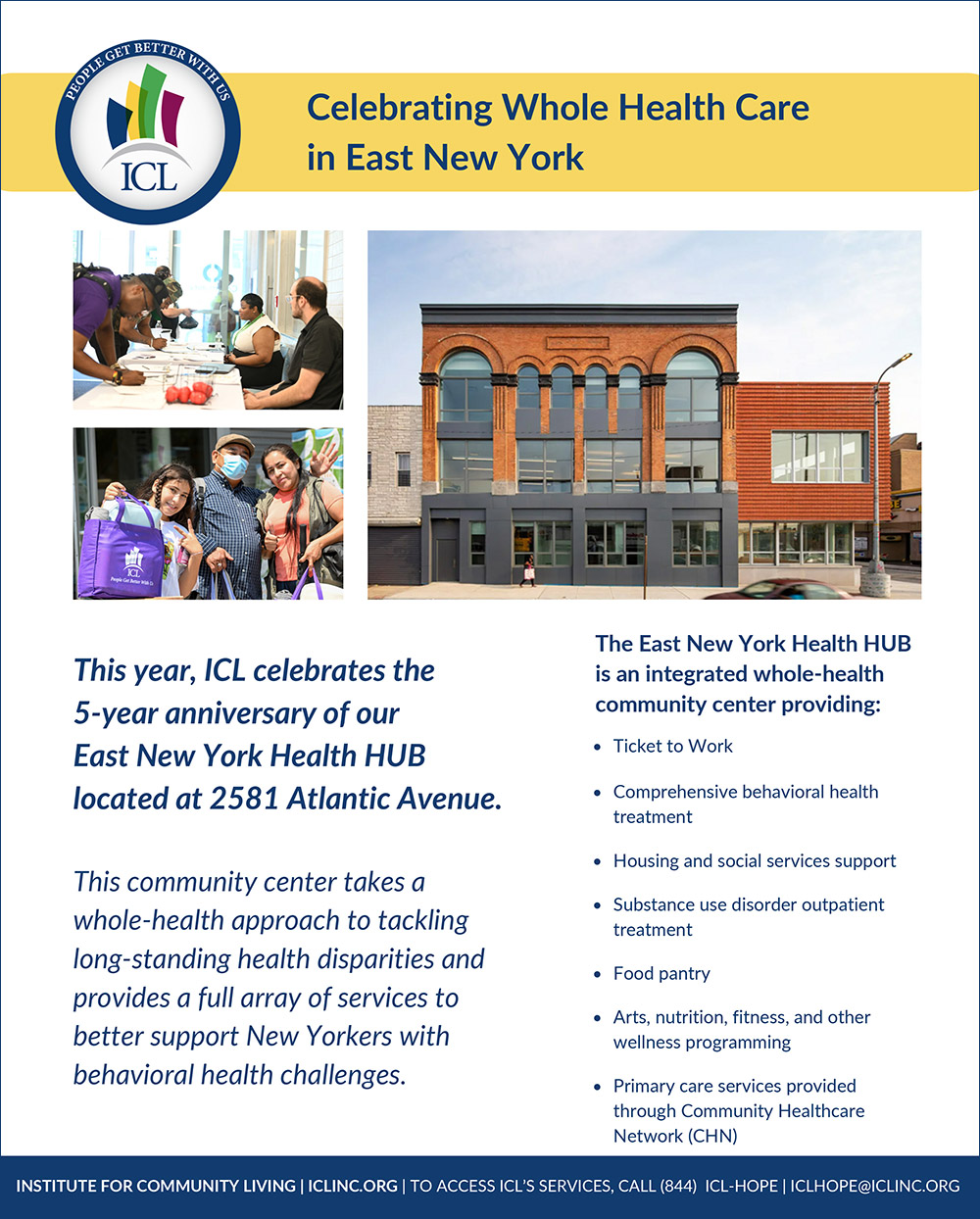When you think of recovery, you often think of what we would consider our social determinants of health: financial stability, housing and surrounding environment, health care access, education, and social connections. When a person is doing well in all these domains, they generally thrive and recover. They’re returning to a healthier version of themselves. And there are various pathways a person can choose for this journey.

Jose Cotto, LCSW
At the Institute for Community Living (ICL), we run nearly 140 programs throughout the New York City boroughs, and we have learned a thing or two about serving those in recovery. Our services address all levels of Maslow’s hierarchy of needs. We have a partnership with Community Healthcare Network (CHN) to provide primary care at our East New York HUB location, where you’ll also find mental health clinics, a food pantry, a day-treatment program with an art room, an employment center, a high number of mobile-treatment teams, housing programs, and specialized and innovative clinical teams that support the full lifespan spectrum – from children to older adults. East New York HUB is just one of our New York City sites that exemplifies the options people can turn to when they need support to move forward.
Regardless of which direction a person chooses for their recovery, they’ll require a few important supports along the way. Housing, an essential social determinant of health, should happen sooner rather than later. In New York City, housing and the physical address it gives a person in recovery is essential when applying for benefits and other resources, including employment. As a part of our behavioral health services, we have provided a spectrum of housing – including community residences, treatment apartment programs, and supported and mixed-use housing (both permanent options).
A bed or a unit in one of these settings is more than a physical space; it’s a place one can call home (even if transitional) where you feel safe and have the privilege to think beyond some of your basic human needs. Having a home helps propel the overall recovery process. It becomes the launching point for some great trajectories. With this basic need taken care of, a person can focus on life goals like creating healthy long-term relationships or developing skills and talents through vocational and employment routes. Can you have a home without income? Technically, you can, but the number of people needing housing drastically outnumbers availability. This is why employment is an important building block in a person’s recovery process.
Employment and vocational opportunities serve many functions. It gives a sense of purpose. It can be why a person gets out of bed in the morning. It can provide a routine outside of your home. Employment also offers a person self-governance/autonomy. When you begin to receive income, the money can leverage decision-making, empowering you to have choices in your life.
One often feels a sense of pride and inclusion from their employment because it makes them a part of the community. Most people feel a sense of genuine happiness from being what they consider a productive citizen in our society. If your values align with the mission and vision of the employer, your work produces even more gratification. You become part of something bigger than yourself. One might even become involved in creating what they feel is social change in a positive direction.
Housing and Employment in Recovery
The relationship between housing and employment in recovery can also provide a window into what’s happening internally for some of us. If our homes are in complete disarray, it may be a sign that we’re overwhelmed and that areas of our lives may be a bit chaotic. If a pattern begins to develop in which a person arrives late to work or calls out sick more than usual, it can indicate that a disconnect has formed or that the person is losing motivation. These social determinants of health become opportunities to reflect and adjust so that recovery doesn’t halt or stagnate. It can be a call for well-being maintenance so that a person doesn’t lose their source of financial stability and potentially their home. We have seen this happen repeatedly, regardless of who has a diagnosis. And it’s an opportunity to review the situation without judgment and look compassionately at inner well-being.
At ICL, whole health guides our mission and treatment strategies. During an agency-wide, whole health drawing exercise, almost everyone included a representation of housing and earned income as essential elements to whole health. When we host health fairs for different communities, we provide several services: yoga, health screenings, nutrition counseling, self-love tables, speed networking, salsa dancing, housing, behavioral health services, and food. But we don’t forget about employment’s essential role in people’s lives. Our human resources recruitment team is present at these events, as well as our Ticket to Work program. Our guests have two employment resources with varying specialties that can accommodate anyone. We hope that through the support of this kind of community work, every person in our city has a chance at the successful life they deserve to lead.
Why Ticket to Work Changes Lives
By Dr. Tasrina Kahn
In collaboration with Ticket to Work, the Institute for Community Living (ICL) Personalized Recovery Oriented Services (PROS) program is designed to support all clients, ages 18 through 64, seeking employment regardless of disability. The PROS employment program holds vocational groups and assists with resume writing, interviewing, career exploration, and referrals to training programs that build employment skills. The goal is to help ensure successful outcomes that lead to stable, long-term employment. Two of our leaders in Ticket to Work are Karenlisa Depanfilis and Leslie Peters, who were instrumental in helping Ann,* who is now one of our colleagues. Ann’s journey is a great example of the challenges a person can face when seeking employment and how overcoming them can lead to success:

Dr. Tasrina Kahn
Ann’s Success Story
Ann had been diagnosed with bipolar and post-traumatic stress disorder when she reached out to ICL to receive support services for housing and employment during her recovery. She felt challenged when coping with stress and pressure. In seeking employment, her goal was to become self–sufficient and financially stable. In her journey toward recovery, she had to face her challenges, integrate into the community, and re-enter the workforce. Her success path included balancing her medications and therapeutic assistance. She then applied for a part-time Peer Specialist position in one of our Supported Housing programs. She was offered the position and was given support by her direct supervisor. She thrives in this role and has helped many people remain stably housed by not only providing excellent care but also by being a model for others and instilling hope.
When Ann was re-entering the workforce, she enrolled in Ticket to Work so that she would be able to maintain Medicaid and other benefits provided by the Ticket to Work program. These benefits were an important part of her recovery support. Without them, her successful transition into the workforce would have been less likely. According to Ann, she felt properly supported through the Ticket to Work Program. She has grown to learn life will always have challenges and stress, but with family support, ICL staff, and her determination for personal success, she will continue to move forward in her career and life.
* While this story is real, the name has been changed to protect privacy.
For more information about the Institute for Community Living services, please visit iclinc.net, call 844-ICL-HOPE, or email ICLHOPE@ICLINC.ORG.




